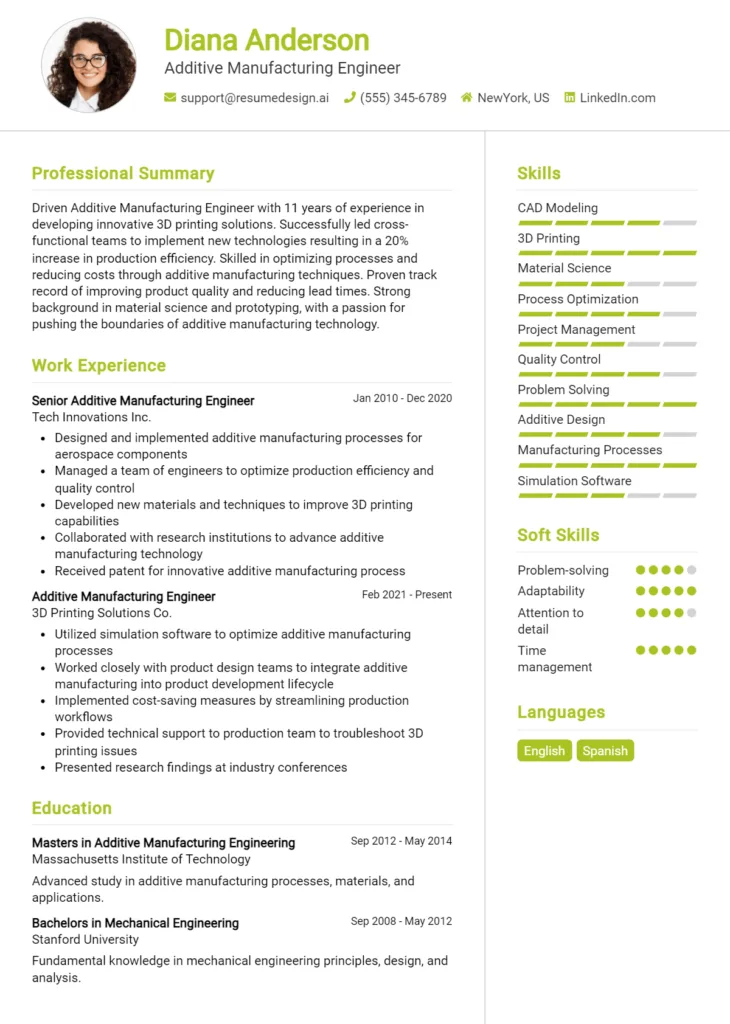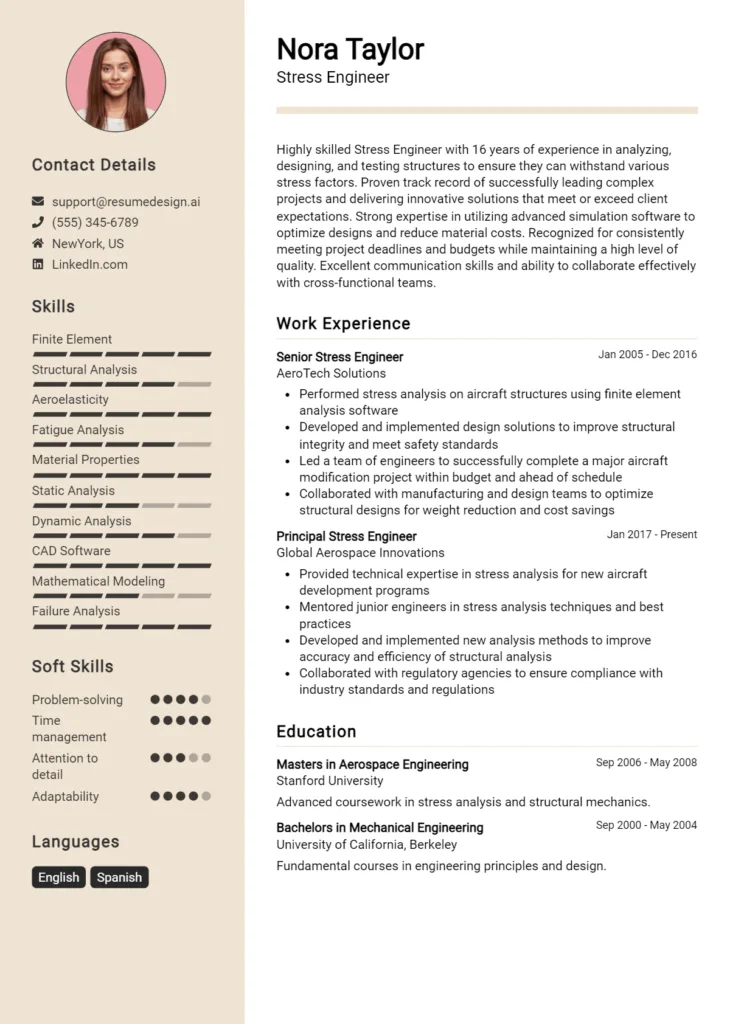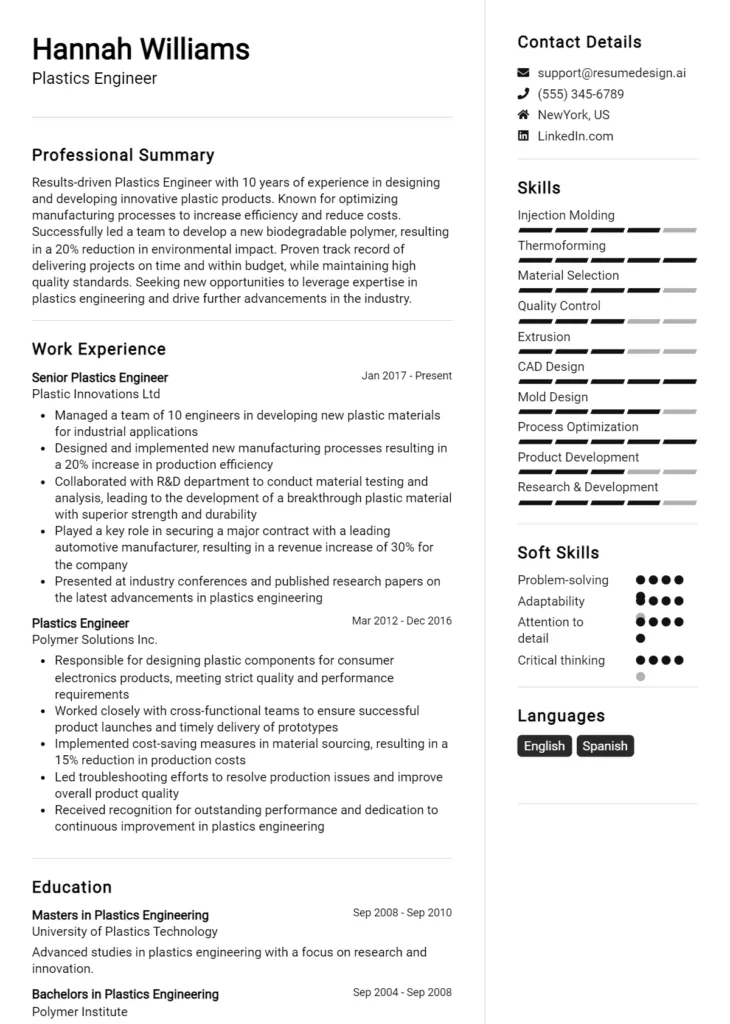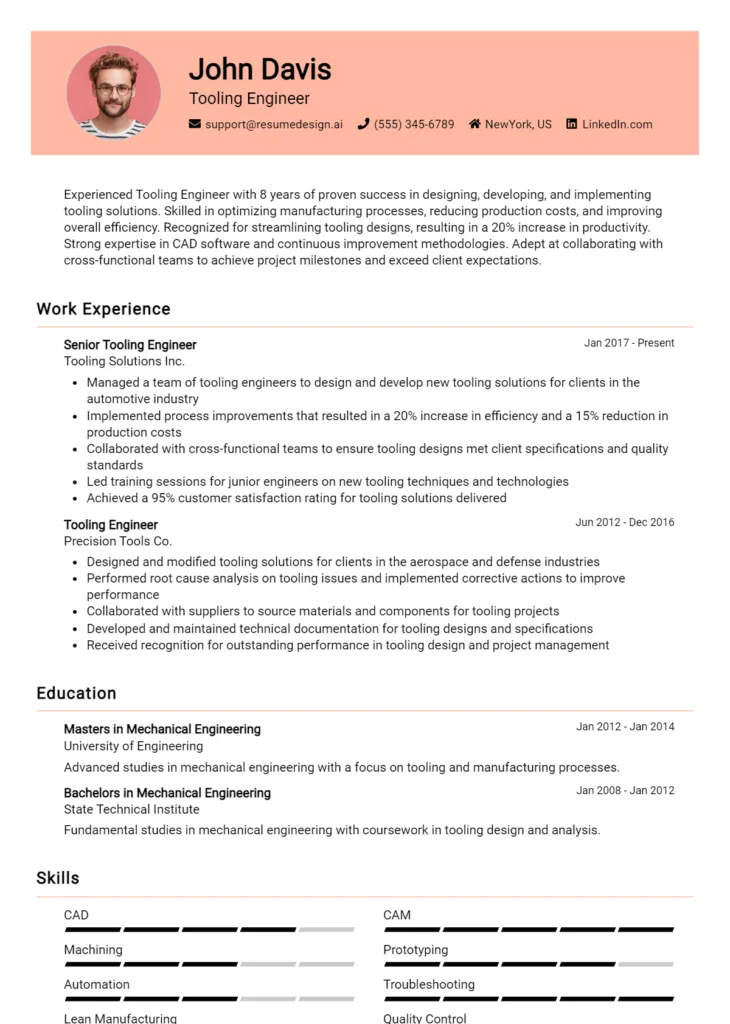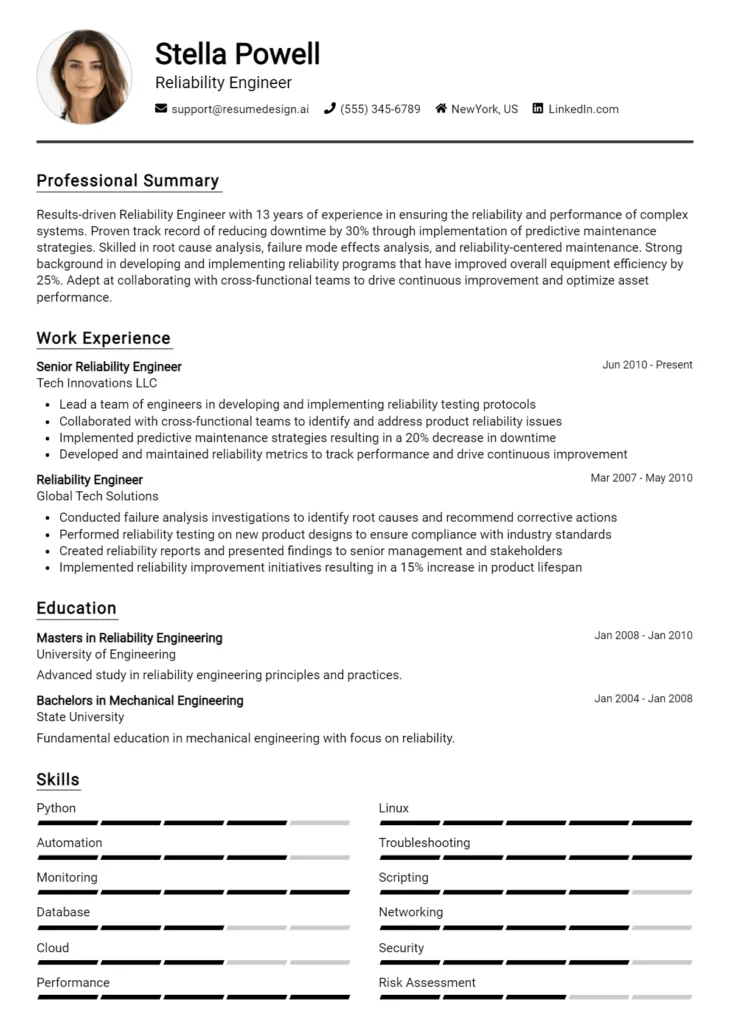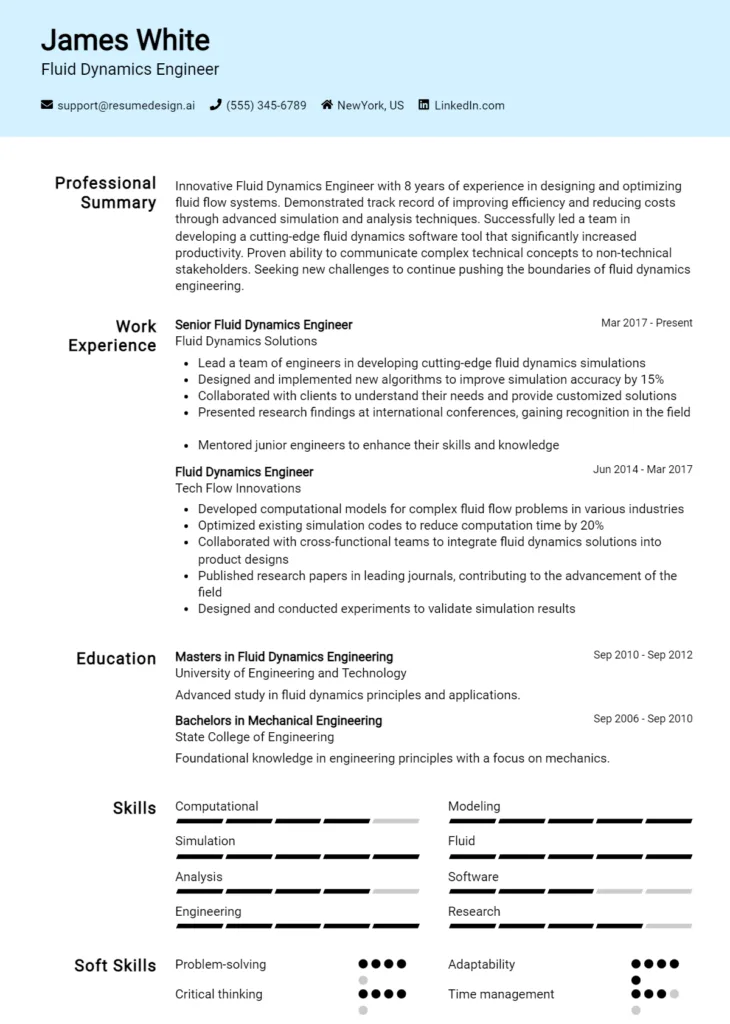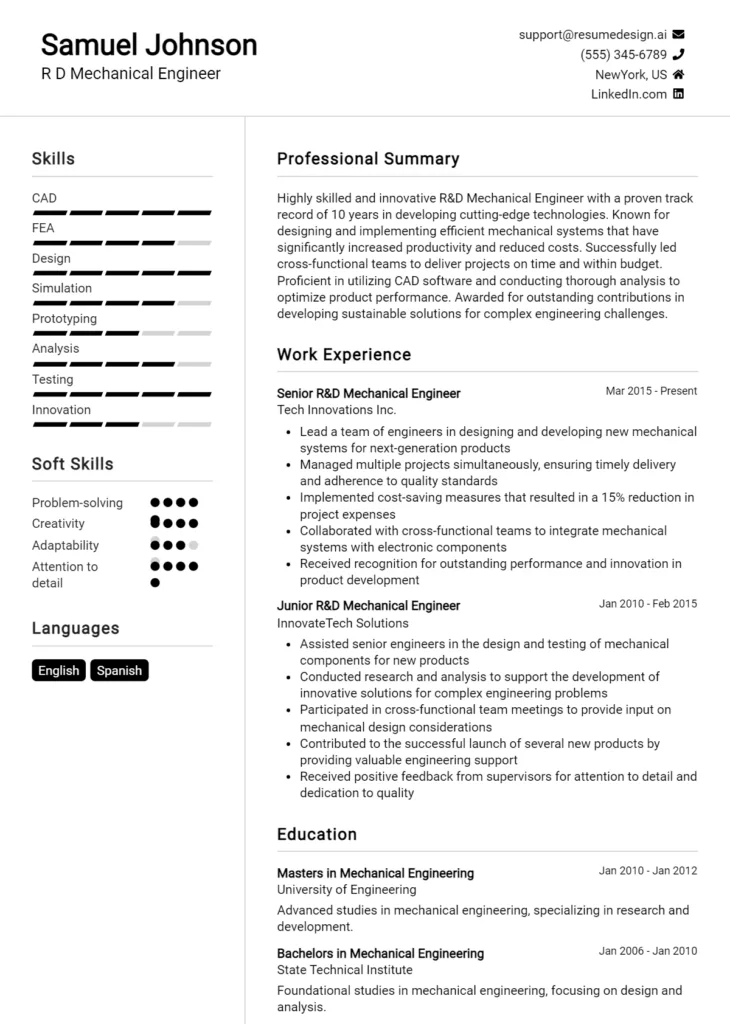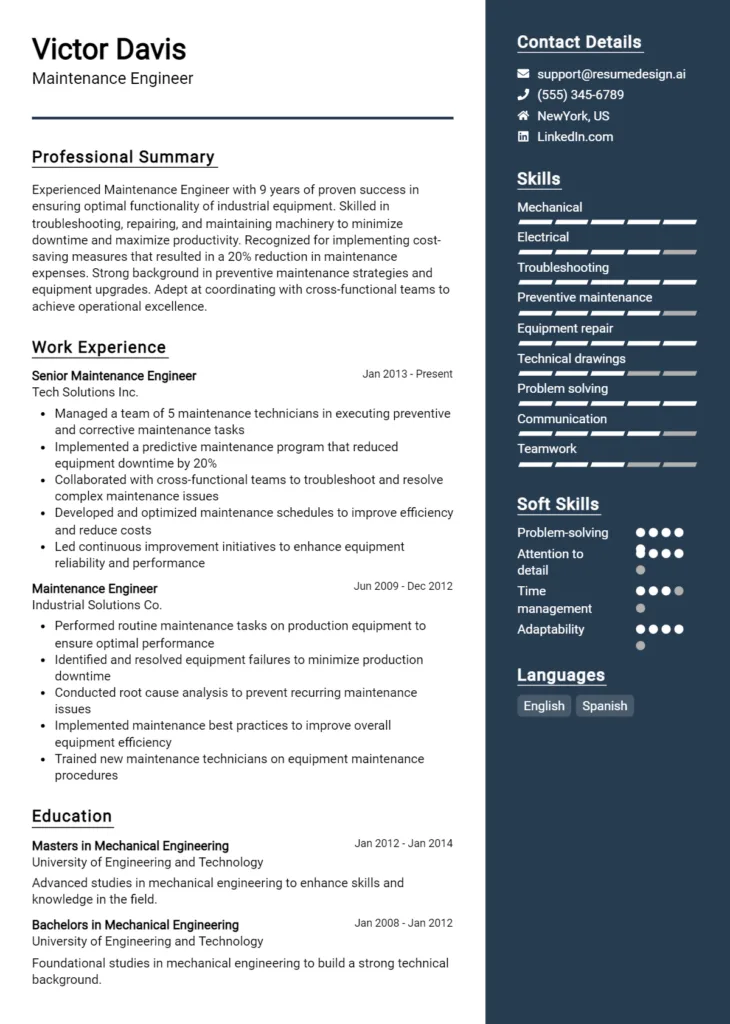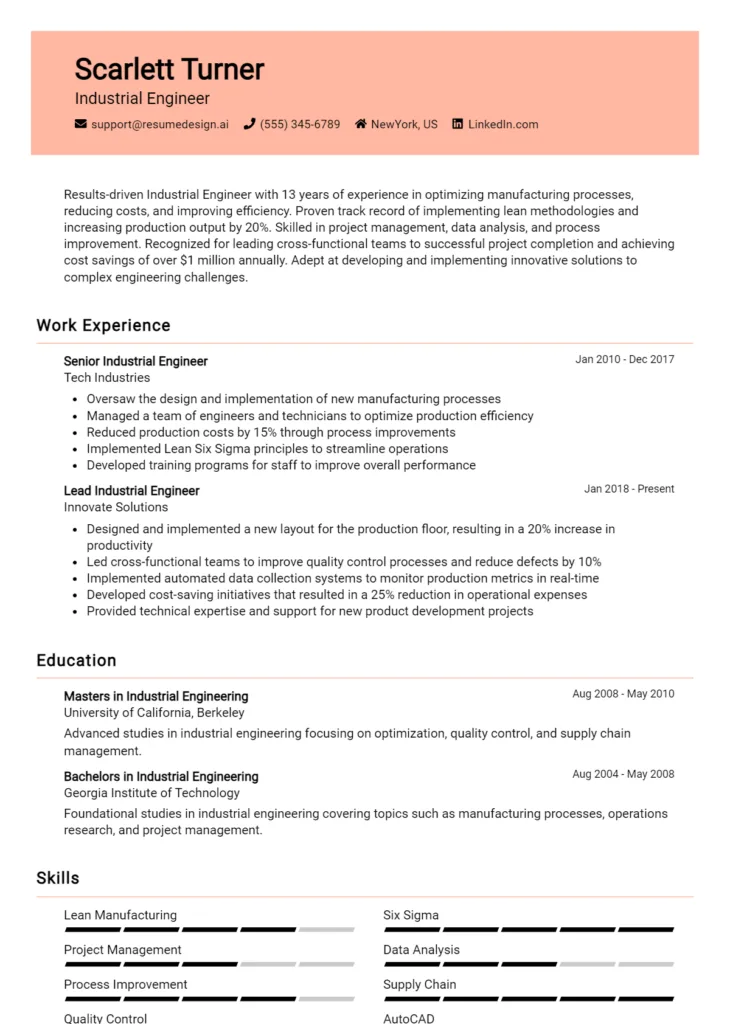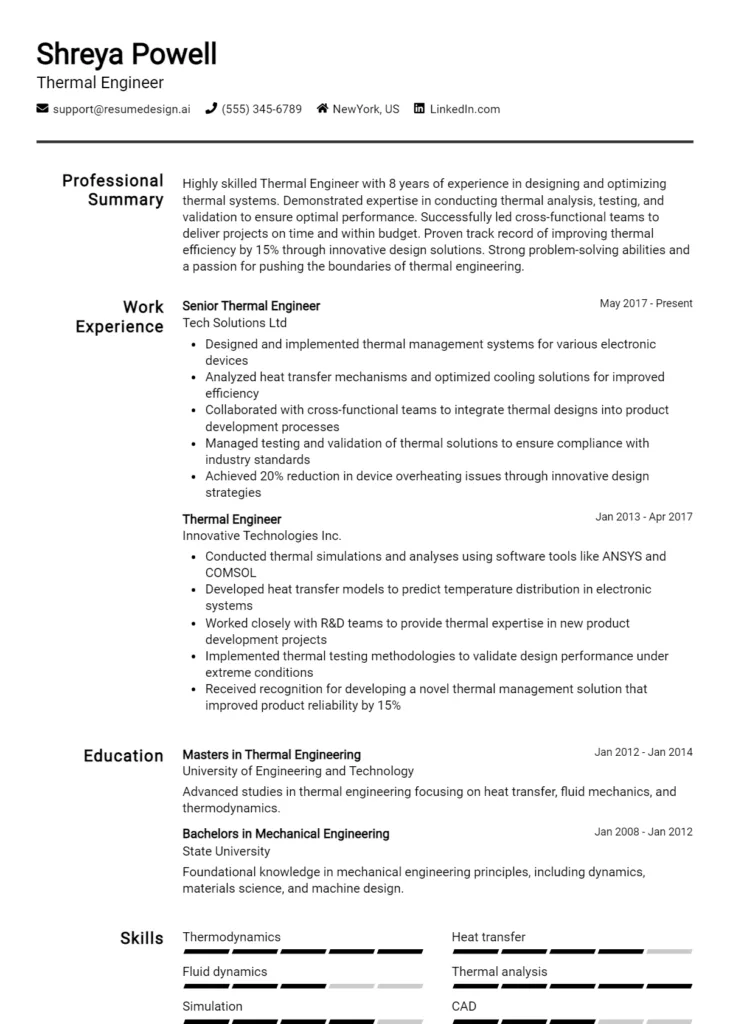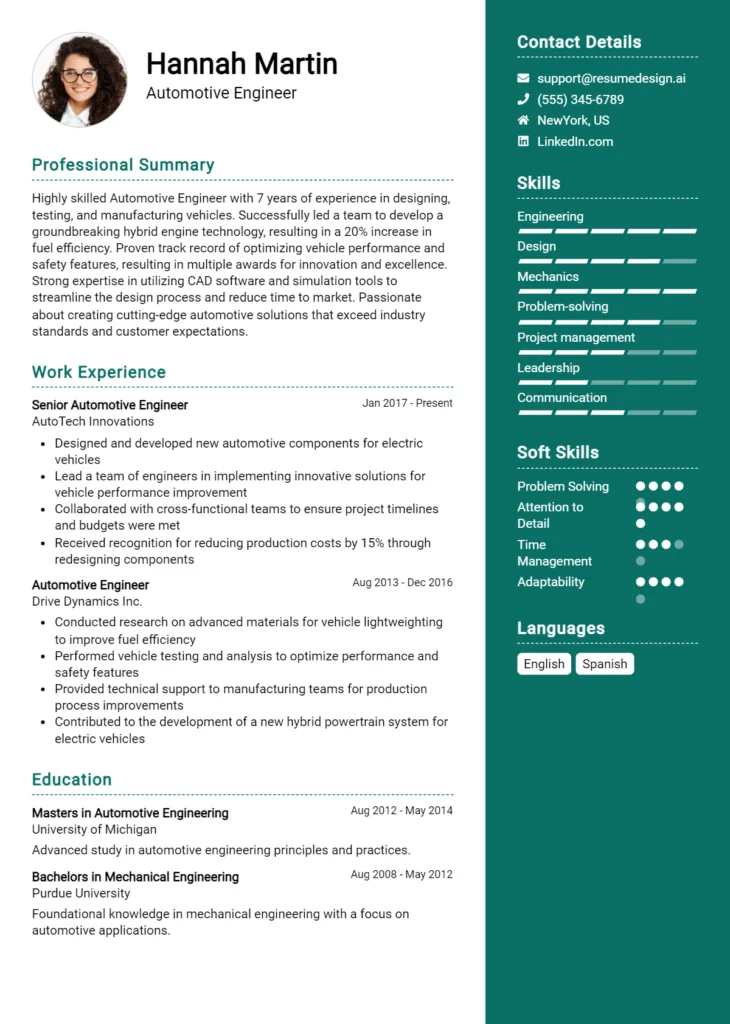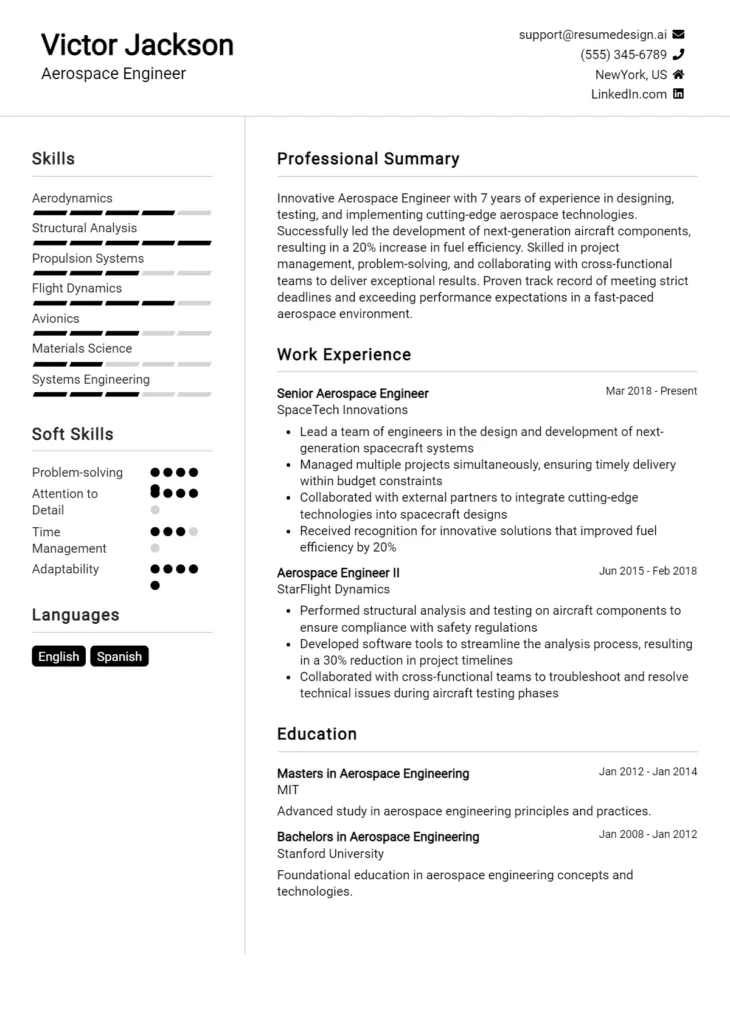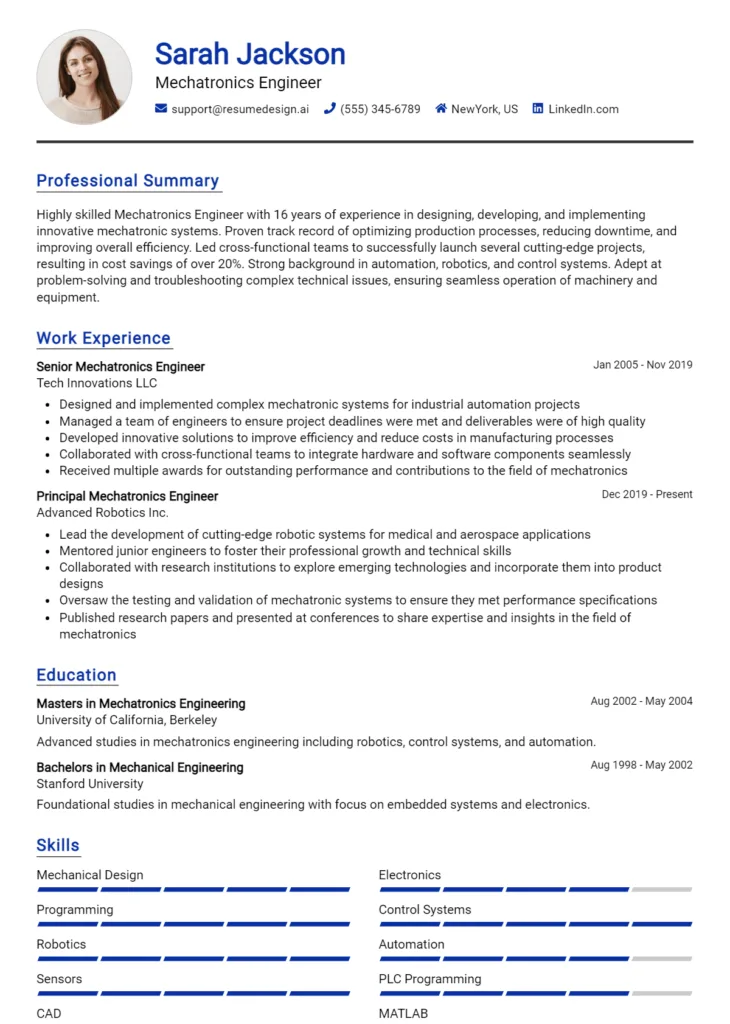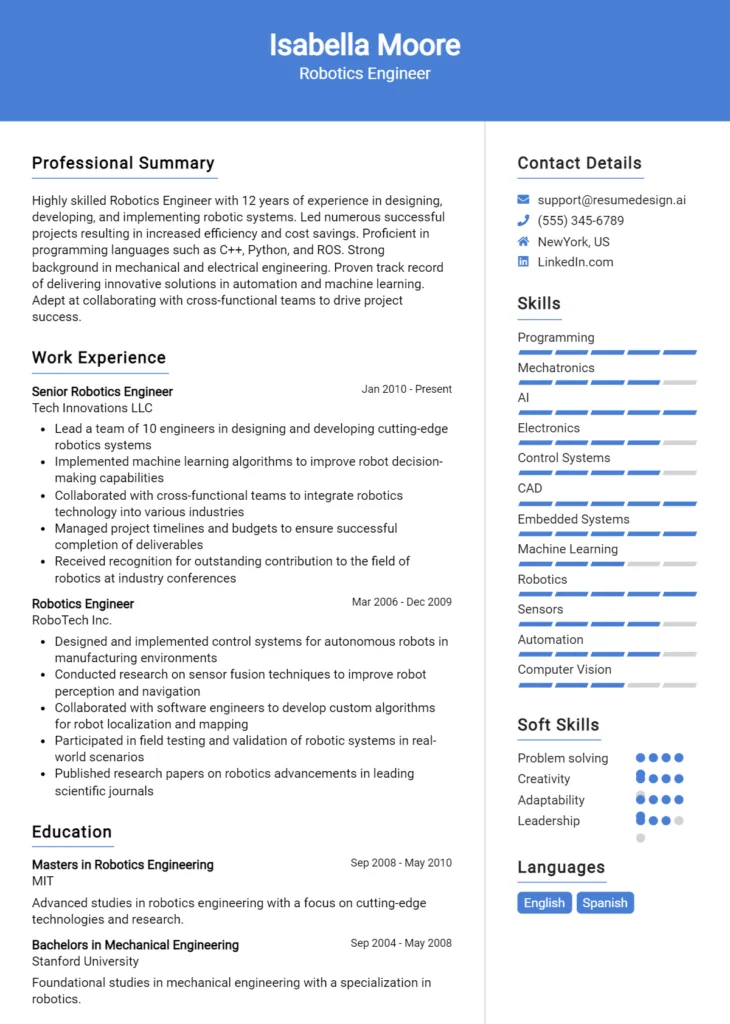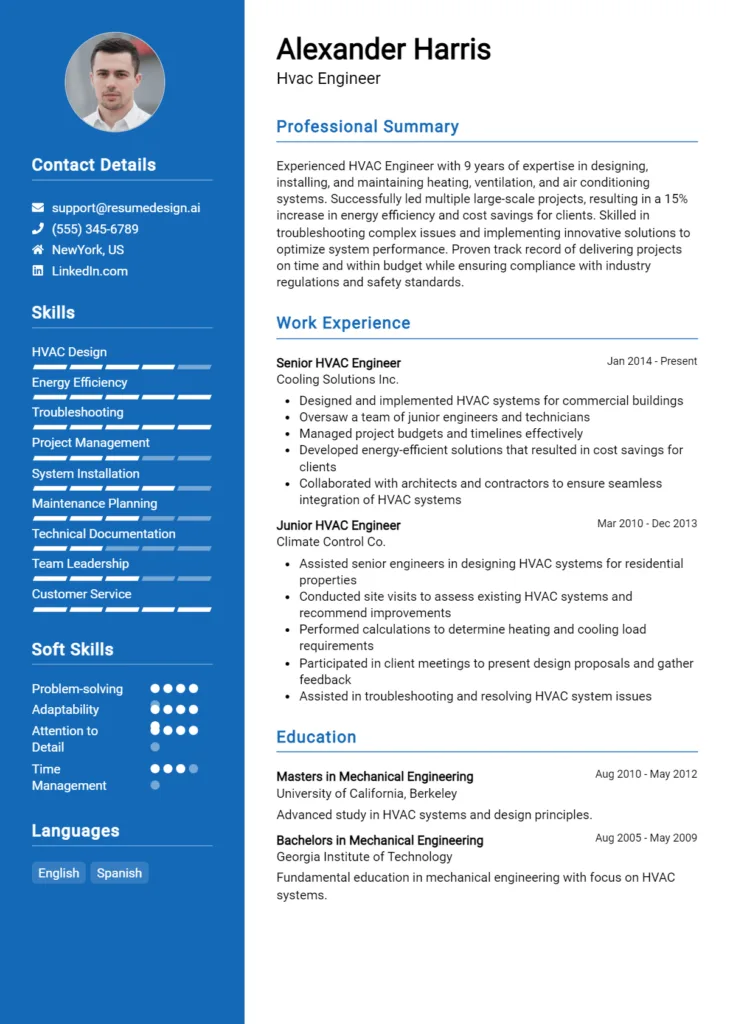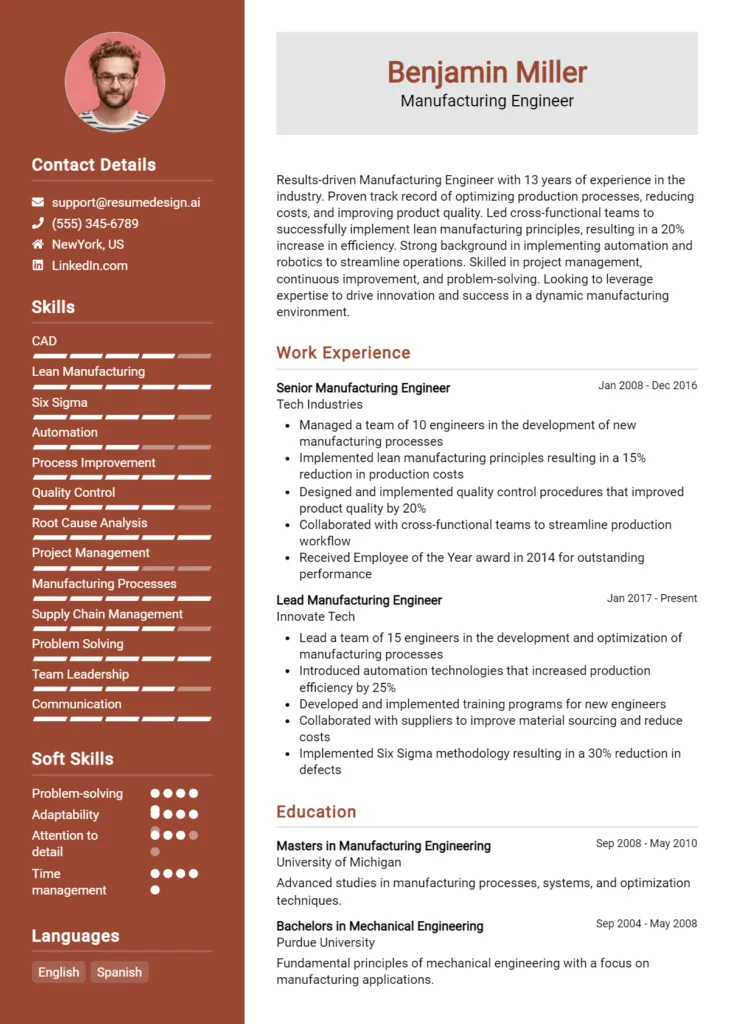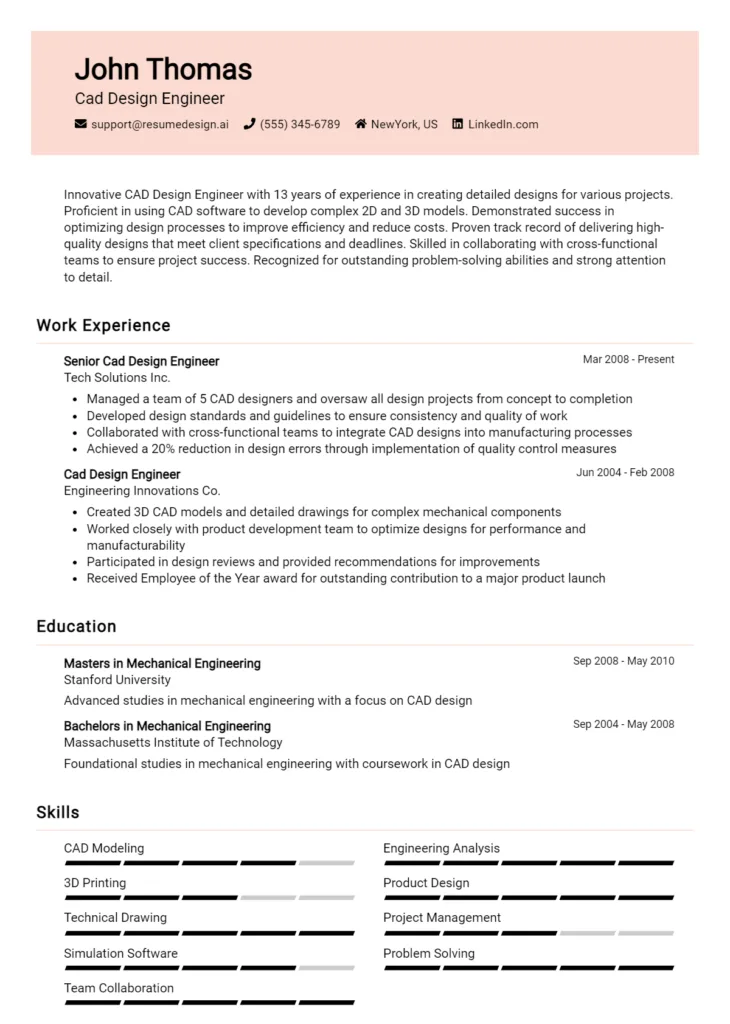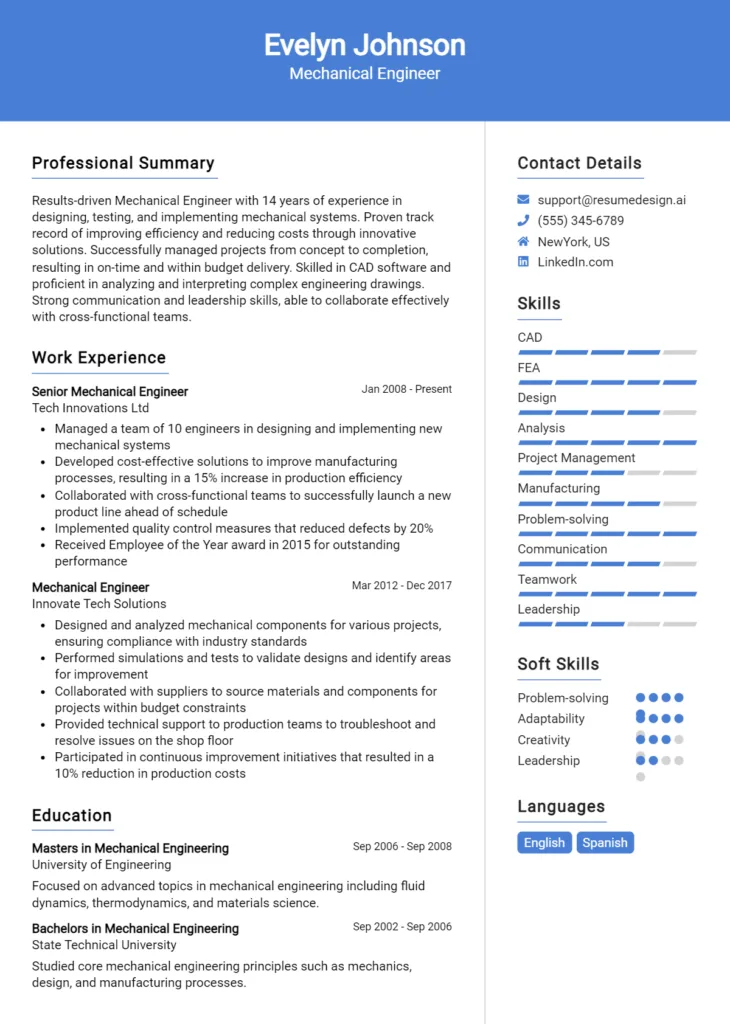Turbomachinery Engineer Core Responsibilities
A Turbomachinery Engineer plays a crucial role in the design, analysis, and optimization of rotating machinery systems, such as turbines and compressors. This position demands a strong foundation in thermodynamics and fluid mechanics, alongside exceptional problem-solving skills. Turbomachinery Engineers collaborate with various departments, including design, manufacturing, and maintenance, ensuring that technical specifications align with operational goals. A well-structured resume that highlights these competencies is essential for showcasing how these skills contribute to the organization’s success.
Common Responsibilities Listed on Turbomachinery Engineer Resume
- Design and analyze turbomachinery components using advanced modeling software.
- Conduct performance tests and troubleshoot operational issues.
- Collaborate with cross-functional teams to improve machine efficiency.
- Develop and implement maintenance strategies for rotating equipment.
- Prepare technical documentation and reports for project stakeholders.
- Perform risk assessments and ensure compliance with safety regulations.
- Optimize performance through data analysis and simulation techniques.
- Provide technical support during the installation and commissioning phases.
- Stay updated on industry trends and emerging technologies.
- Assist in the training and development of junior engineers.
High-Level Resume Tips for Turbomachinery Engineer Professionals
A well-crafted resume is crucial for Turbomachinery Engineer professionals, as it serves as the first impression a candidate makes on potential employers. In a competitive field where technical expertise and innovative problem-solving skills are paramount, a resume must effectively showcase both the candidate's capabilities and achievements. It is essential to present a clear narrative of one's professional journey, highlighting relevant experiences and accomplishments that align with the job requirements. This guide will provide practical and actionable resume tips specifically tailored for Turbomachinery Engineer professionals, helping you to stand out in the job market.
Top Resume Tips for Turbomachinery Engineer Professionals
- Tailor your resume to the job description by using keywords and phrases that match the specific requirements of the position.
- Showcase relevant experience by highlighting projects and roles that align with turbomachinery principles and applications.
- Quantify your achievements with metrics and data to demonstrate the impact of your contributions, such as efficiency improvements or cost reductions.
- Highlight industry-specific skills, such as fluid dynamics, thermodynamics, and computational fluid dynamics (CFD) software proficiency.
- Include certifications and professional memberships relevant to turbomachinery, such as ASME or AIAA, to validate your expertise.
- Utilize a clean and professional format to enhance readability and ensure that important information stands out.
- Incorporate a strong summary statement that captures your experience, skills, and career objectives in a few compelling sentences.
- Demonstrate your problem-solving abilities through examples of challenges faced and solutions implemented in past projects.
- Keep your resume concise, ideally one page, while ensuring all critical information is effectively communicated.
- Proofread your resume meticulously to eliminate any grammatical or typographical errors that could detract from your professionalism.
By implementing these tips, Turbomachinery Engineer professionals can significantly enhance their resumes, increasing their chances of landing a job in this specialized field. A well-structured and targeted resume not only showcases your technical expertise but also demonstrates your commitment to the profession, making you a more attractive candidate to potential employers.
Why Resume Headlines & Titles are Important for Turbomachinery Engineer
In the competitive field of turbomachinery engineering, a well-crafted resume headline or title serves as a critical first impression for potential employers. It encapsulates a candidate's core qualifications and areas of expertise in a succinct manner, allowing hiring managers to quickly assess whether the applicant meets their needs. A strong headline can instantly grab attention and differentiate a candidate from the multitude of resumes they receive. Therefore, it should be concise, relevant, and directly aligned with the specific job being applied for, setting the tone for the rest of the resume.
Best Practices for Crafting Resume Headlines for Turbomachinery Engineer
- Keep it concise: Aim for a headline that is brief yet informative, ideally one sentence or phrase.
- Be specific: Tailor your headline to reflect the job title and relevant skills or experiences required for the position.
- Highlight key qualifications: Include specific achievements or areas of expertise that make you stand out.
- Use industry keywords: Incorporate relevant terminology that aligns with the job description to enhance visibility.
- Convey value: Focus on what you can bring to the organization rather than just listing roles or responsibilities.
- Avoid jargon: Use clear and straightforward language that can be easily understood by hiring managers.
- Make it compelling: Use action-oriented language that energizes and engages the reader.
- Revisit and revise: Continuously refine your headline based on feedback and changes in your career focus.
Example Resume Headlines for Turbomachinery Engineer
Strong Resume Headlines
"Innovative Turbomachinery Engineer with 10+ Years of Experience in High-Efficiency Design"
“Expert in Turbocharger Development and Performance Optimization for Aerospace Applications"
“Dynamic Mechanical Engineer Specializing in Turbine Efficiency Improvements and Energy Recovery Systems"
Weak Resume Headlines
“Engineer Looking for Job”
“Experienced Professional”
The strong headlines are effective because they provide clear, specific information that highlights the candidate's qualifications and areas of expertise, directly aligning with what hiring managers seek. In contrast, the weak headlines fail to impress due to their vagueness and lack of relevance; they do not convey any meaningful insight into the candidate's skills or potential contributions, making them easy to overlook in a competitive job market.
Writing an Exceptional Turbomachinery Engineer Resume Summary
A resume summary is a crucial component for a Turbomachinery Engineer, as it serves as the first impression for hiring managers. It succinctly encapsulates the candidate's key skills, relevant experience, and notable accomplishments, allowing hiring managers to quickly assess their fit for the role. A well-crafted summary not only highlights the candidate's technical expertise in turbomachinery but also demonstrates their ability to contribute to the organization's goals. Therefore, it should be concise, impactful, and tailored to the specific job description to maximize its effectiveness.
Best Practices for Writing a Turbomachinery Engineer Resume Summary
- Quantify achievements: Use specific metrics to demonstrate the impact of your work.
- Focus on relevant skills: Highlight technical skills and competencies that are directly applicable to the job.
- Tailor the summary: Customize the summary to align with the specific job description and requirements.
- Use strong action verbs: Start sentences with powerful action verbs to convey confidence and decisiveness.
- Be concise: Keep the summary brief, ideally within 3-5 sentences, to maintain the reader's attention.
- Showcase problem-solving abilities: Highlight experiences where you successfully addressed challenges in turbomachinery.
- Include certifications or qualifications: Mention any relevant certifications or advanced degrees that enhance your expertise.
- Demonstrate collaboration: Emphasize your ability to work effectively within multidisciplinary teams.
Example Turbomachinery Engineer Resume Summaries
Strong Resume Summaries
Results-driven Turbomachinery Engineer with over 8 years of experience in designing and optimizing gas turbines, contributing to a 15% increase in efficiency at XYZ Corp. Proficient in advanced computational fluid dynamics (CFD) software and committed to driving innovative solutions in energy production.
Dynamic Turbomachinery Engineer specializing in turbine performance analysis, with a proven track record of reducing downtime by 20% through effective predictive maintenance strategies. Skilled in project management and cross-functional team collaboration to deliver projects on time and within budget.
Detail-oriented Turbomachinery Engineer with extensive experience in rotor dynamics and vibration analysis, resulting in a 30% reduction in operational failures during the last fiscal year. Adept at utilizing data analytics to enhance design processes and improve overall system reliability.
Weak Resume Summaries
Experienced engineer with a background in turbomachinery looking for a new opportunity. Good at working in teams and solving problems.
Turbomachinery Engineer with skills in various engineering tasks. Seeking to leverage my expertise in a challenging position.
The strong resume summaries are considered effective because they provide specific examples of achievements, quantify results, and directly relate to the skills demanded by the role of a Turbomachinery Engineer. In contrast, the weak summaries lack detail, are too generic, and do not convey any measurable accomplishments or relevant skills, making them less compelling to potential employers.
Work Experience Section for Turbomachinery Engineer Resume
The work experience section of a Turbomachinery Engineer resume is vital as it serves as a showcase of the candidate's technical skills, project management abilities, and capacity to deliver high-quality products. This section allows potential employers to assess how past roles have prepared the candidate to meet the demands of the turbomachinery field. By quantifying achievements and aligning their experience with industry standards, candidates can effectively demonstrate their value and readiness for the challenges ahead.
Best Practices for Turbomachinery Engineer Work Experience
- Highlight specific technical skills relevant to turbomachinery, such as fluid dynamics, thermodynamics, and materials science.
- Quantify achievements with metrics, such as efficiency improvements, cost savings, or project timelines.
- Showcase leadership or team management experiences, emphasizing collaborative project outcomes.
- Align job responsibilities with industry standards and best practices to demonstrate relevance.
- Use action verbs to initiate bullet points, conveying a strong sense of ownership and initiative.
- Include a variety of experiences, from internships to full-time roles, to illustrate career progression.
- Tailor the work experience section to match the specific job description, emphasizing relevant skills and achievements.
- Incorporate keywords from the job listing to optimize the resume for applicant tracking systems (ATS).
Example Work Experiences for Turbomachinery Engineer
Strong Experiences
- Led a cross-functional team of 10 engineers to design a new turbine model, resulting in a 15% increase in efficiency and a 20% reduction in manufacturing costs.
- Developed and implemented a predictive maintenance program that reduced equipment downtime by 30%, saving the company $500,000 annually.
- Managed the successful completion of a $2 million turbine upgrade project ahead of schedule, improving client satisfaction ratings by 25%.
- Collaborated with a team of researchers to publish three peer-reviewed papers on advanced turbomachinery technologies, enhancing the company's reputation in the industry.
Weak Experiences
- Worked on various projects related to turbomachinery.
- Assisted team members with their tasks and contributed to team meetings.
- Involved in the design process for turbine components without specific outcomes.
- Participated in training sessions about turbomachinery without detailing any applications or results.
The examples of strong experiences are considered effective because they quantify results, showcase technical leadership, and highlight collaborative efforts that led to significant outcomes. In contrast, the weak experiences lack detail and specificity, making it difficult for potential employers to gauge the candidate's exact contributions and impact within their roles. By focusing on measurable achievements and relevant skills, candidates can significantly enhance their resumes in the competitive field of turbomachinery engineering.
Education and Certifications Section for Turbomachinery Engineer Resume
The education and certifications section of a Turbomachinery Engineer resume is crucial as it showcases the candidate's academic foundation and commitment to professional development in a highly specialized field. This section underscores the importance of possessing relevant degrees, industry-recognized certifications, and ongoing education, all of which are vital for demonstrating expertise in turbomachinery design, analysis, and operation. By providing details on relevant coursework and specialized training, candidates can significantly enhance their credibility and align their qualifications with the specific demands of the job role.
Best Practices for Turbomachinery Engineer Education and Certifications
- Prioritize relevant degrees in mechanical engineering, aerospace engineering, or related fields.
- List certifications from recognized industry organizations, such as ASME or IEEE.
- Include specialized training in turbomachinery design, analysis, or computational fluid dynamics.
- Highlight advanced degrees (Master’s or Ph.D.) that demonstrate a deeper understanding of the subject matter.
- Be specific about relevant coursework that directly pertains to turbomachinery principles.
- Keep the information up to date, removing outdated certifications that no longer hold value in the industry.
- Emphasize continuing education courses that reflect a commitment to staying current with technological advancements.
- Format the section clearly to make key information easily accessible to hiring managers.
Example Education and Certifications for Turbomachinery Engineer
Strong Examples
- M.S. in Mechanical Engineering, University of Michigan, 2021
- Certified Turbomachinery Engineer (CTE) from the Turbomachinery & Pump Symposia
- Relevant Coursework: Advanced Fluid Dynamics, Thermodynamics of Turbomachinery, and Computational Methods in Engineering
- Professional Development: Completed an Advanced Course in Aerodynamics of Turbines, 2022
Weak Examples
- Bachelor of Arts in English Literature, University of California, 2018
- Certification in Basic Project Management (not industry-specific)
- Completed a course on General Engineering Principles (not focused on turbomachinery)
- Outdated certification in HVAC Systems, expired in 2020
The strong examples listed above are considered relevant and impactful because they directly align with the expectations and requirements of a Turbomachinery Engineer position, showcasing both advanced education and specialized training. In contrast, the weak examples lack relevance to the field, featuring degrees and certifications that do not contribute to the candidate's qualifications for turbomachinery roles, ultimately weakening their resume's effectiveness.
Top Skills & Keywords for Turbomachinery Engineer Resume
In the competitive field of turbomachinery engineering, showcasing the right skills on your resume is essential for standing out to potential employers. A well-rounded skill set not only demonstrates your technical proficiency but also highlights your ability to collaborate, innovate, and solve complex problems. Employers seek engineers who can not only design and optimize turbomachinery systems but also communicate effectively with multidisciplinary teams. By emphasizing both hard and soft skills, you can create a compelling resume that reflects your capabilities and readiness to tackle the challenges in this dynamic industry.
Top Hard & Soft Skills for Turbomachinery Engineer
Soft Skills
- Effective Communication
- Team Collaboration
- Problem-Solving
- Critical Thinking
- Time Management
- Adaptability
- Attention to Detail
- Leadership
- Creativity
- Conflict Resolution
- Project Management
- Decision Making
- Interpersonal Skills
- Initiative
Hard Skills
- Fluid Dynamics
- Thermodynamics
- Computational Fluid Dynamics (CFD)
- Mechanical Design
- Finite Element Analysis (FEA)
- Turbomachinery Design Principles
- Performance Analysis and Testing
- System Integration
- MATLAB and Simulink Proficiency
- CAD Software (e.g., SolidWorks, AutoCAD)
- Reliability Engineering
- Data Analysis and Interpretation
- Energy Conversion Principles
- Manufacturing Processes
- Quality Assurance Techniques
- System Modeling
For more detailed guidance on how to incorporate these skills effectively into your resume, and to understand how to present your work experience, consider reviewing industry-specific examples and best practices.
Stand Out with a Winning Turbomachinery Engineer Cover Letter
Dear [Hiring Manager's Name],
I am writing to express my interest in the Turbomachinery Engineer position at [Company Name], as advertised on [Job Board/Company Website]. With a robust background in mechanical engineering and extensive experience in the design, analysis, and optimization of turbomachinery systems, I am excited about the opportunity to contribute my expertise to your team. My hands-on experience with computational fluid dynamics (CFD) and finite element analysis (FEA) in conjunction with my solid understanding of thermodynamics and fluid mechanics uniquely positions me to excel in this role.
During my previous role at [Previous Company Name], I successfully led a project that focused on improving the efficiency of gas turbine engines, resulting in a 15% performance improvement. This involved not only analyzing existing designs but also collaborating closely with cross-functional teams to implement innovative solutions. I have a proven track record of identifying areas for enhancement and executing design modifications that meet both technical specifications and client expectations. My ability to adapt to rapidly changing project requirements, while maintaining a keen focus on safety and regulatory compliance, has been pivotal in my career.
I am particularly drawn to [Company Name] because of its commitment to innovation and sustainability in the field of turbomachinery. I am eager to bring my skills in project management and technical problem-solving to your esteemed organization. I am confident that my proactive approach and attention to detail will help drive successful outcomes for your projects. I welcome the opportunity to further discuss how my background, skills, and enthusiasms align with the needs of your team.
Thank you for considering my application. I look forward to the possibility of contributing to [Company Name] and am excited about the opportunity to advance my career as part of your esteemed engineering team.
Sincerely,
[Your Name]
[Your Phone Number]
[Your Email Address]
Common Mistakes to Avoid in a Turbomachinery Engineer Resume
When crafting a resume for a Turbomachinery Engineer position, it's essential to present your qualifications and experiences effectively. However, many candidates inadvertently make common mistakes that can diminish their chances of landing an interview. Understanding these pitfalls can help you create a compelling resume that highlights your skills and expertise in turbomachinery. Below are some frequent errors to avoid:
Vague Job Descriptions: Failing to provide specific details about your previous roles can leave hiring managers unclear about your actual responsibilities and achievements.
Ignoring Keywords: Many companies use applicant tracking systems (ATS) to filter resumes. Neglecting to include relevant industry-specific keywords can result in your resume being overlooked.
Overloading with Technical Jargon: While technical skills are crucial, using excessive jargon can alienate readers who may not be familiar with the terms. Aim for clarity and balance.
Lack of Quantifiable Achievements: Simply listing responsibilities without showcasing measurable outcomes (e.g., "improved efficiency by 20%") misses an opportunity to demonstrate your impact.
Inconsistent Formatting: A cluttered or inconsistent layout can distract from your content. Ensure uniformity in font sizes, bullet points, and spacing for a polished appearance.
Too Much Focus on Education: While your educational background is important, overemphasizing it at the expense of relevant work experience can misrepresent your practical expertise.
Ignoring Soft Skills: Turbomachinery engineering is a collaborative field. Failing to highlight soft skills, such as teamwork and communication, can give the impression that you are not well-rounded.
Typos and Grammatical Errors: Simple mistakes can undermine your professionalism. Always proofread your resume or have someone else review it to catch any errors before submission.
Conclusion
As a Turbomachinery Engineer, you play a crucial role in the design, development, and optimization of machinery that harnesses the power of fluids—be it gas or liquid. This article has explored the essential skills and qualifications required for success in this field, such as proficiency in thermodynamics, fluid mechanics, and materials science. We’ve also highlighted the importance of hands-on experience, problem-solving abilities, and teamwork in delivering efficient and innovative turbomachinery solutions.
In addition to technical expertise, having a well-crafted resume is vital for standing out in the competitive job market. Make sure your resume reflects your unique skills, experiences, and accomplishments in turbomachinery. To help you with this, consider utilizing available resources such as resume templates, which can provide a professional layout; a resume builder, designed to simplify the creation process; and resume examples to inspire your own content. Don’t forget to pair your resume with a compelling cover letter template to make a strong first impression.
Now is the time to take action! Review your Turbomachinery Engineer resume to ensure it showcases your best qualifications and aligns with the demands of the industry. Utilize these tools to enhance your chances of landing your dream job.

